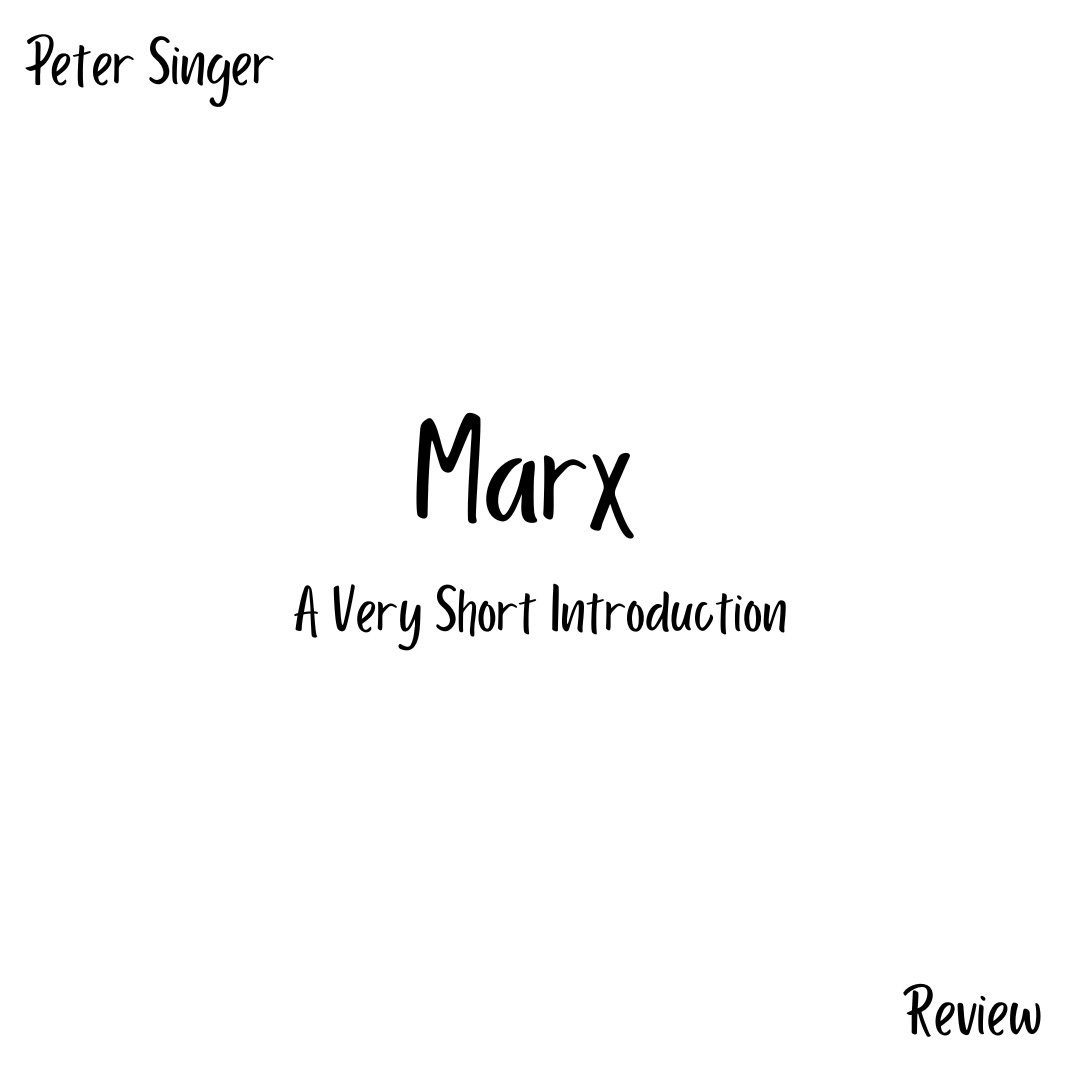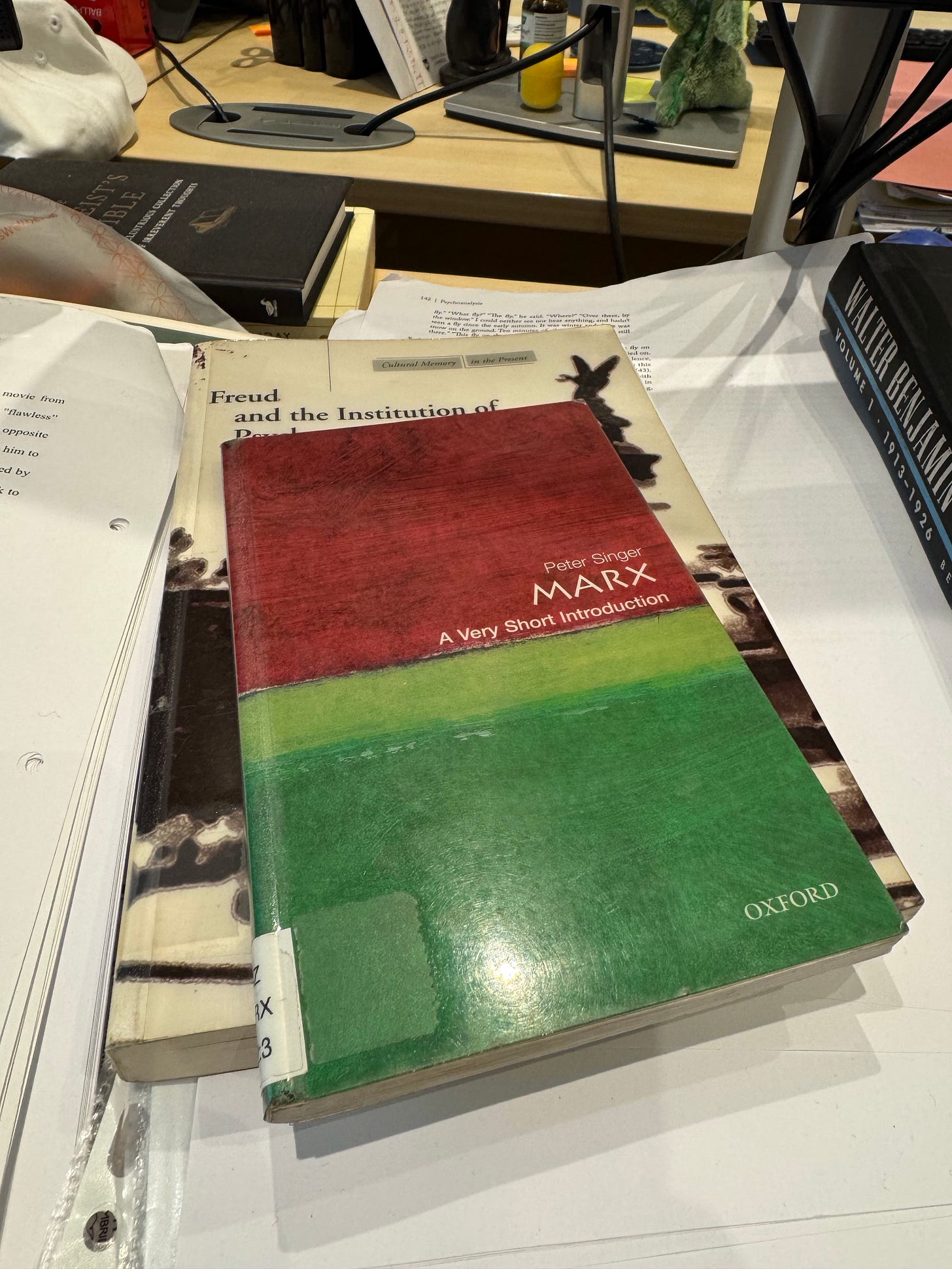Marx: A Very Short Introduction | Peter Singer
When I studied at Oxford I did not envy those who were privileged because I saw what their utopia of resources had done to them.
Let’s start with Peter Singer first — a contemporary philosopher and a heavily acclaimed academic, not in economics I believe, who had also written A Very Short Introduction on Hegel too. This begs the question why did Oxford University Press ask a philosopher to write an introductory text on Karl Marx rather than an economist?
A old flatmate of mine, visiting research fellow in medieval history, had heard I was making my way through Kant and Hegel and had said to me ‘Well you know where you’re heading to?’ And laughed, as I laughed too — until he boomed — ‘You should just go straight to Marx instead!’
Which I think is exactly the problem. A lot of people start with Marx in order to understand Marxism — but that’s almost a hopeless endeavour, unless you’re able to see the Kantian and Hegelian building blocks within Marx’s writing, which you’d probably have some chance in getting from Marx’s Critique of Hegel’s Philosophy of Right rather than his later writings like Capital.
Singer shows how Marx’s economic critiques are heavily built off Hegel — and how Marx should be seen as a philosopher, a continental philosopher, rather than an economist or a scientist.
Anna has gone from dating a marxist to a psychoanalyst, both Marx and Freud proposed their work as a science rather than a type of philosophy or theory — despite the connotations of a ‘psychoanalyst’, part of my work is to show that I share neither of Marx or Freud’s view on this regard — and even further than that, to show that how their work acts as a fiction rather than a science can actually be a positive.
Now to stop beating around the bush — from Kant you’ll engage with the ideas on whether we’re in the matrix — just a brain in a vat? And realise that you may not be able to prove the origin of all things — but you can determine what’s right in front of you. In other words I might not be able to prove that this universe is God’s doing, but I do know that this material universe exists — I might not understand why hunger exists in this world — but I do know that I’m hungry.
Through Kant you also engage with the free will vs determinism debate, and hopefully realise for yourself that you at least have a sense of free will; through Hegel you understand the spiritual relationship that you have with something bigger than yourself — not God with a capital G but more what we would call the Unconscious or circumstances — what Hegel defines as the Absolute Spirit. Hegel explains how you influence your circumstances, which then influence you — dialectically this interchange is building and collapsing, propelling us seemingly forwards through time’s arrow. I would also say that to understand Hegel it’s beneficial to understand Buddhism, to meditate and feel for yourself the tug of war your will has with contingency, the subtle inflexions of circumstance and involuntary memory that intersperse, breast-stroke, through your ego — how your will is affected by circumstances. Through both Buddhism and Hegel you also have a better understanding of the free will vs determinism debate too, as Hegel cleans up Kant’s theories on freedom and shows that during those times when we’re alienated from the Absolute Spirit we feel like an individual with agency, but once we’re coincided with the Spirit we feel like we are interconnected with the Spirit — and how it’s normal for humans to flicker between these two states of being. Being present and being alienated.
Marx comes in as a Hegelian reader and critic. He sees Hegel’s ideas of humanity growing through the ages in its strife for freedom. Marx sees how money, and material wealth, is the last obstacle that is stopping people from feeling free. In that if you are not wealthy, you have to work in order to do the things that you want to. And under a capitalist system, many workers will work for employers rather than for themselves — which means spiritually you will, by definition, stop enacting your own freedom and exist for someone else, where even if you fulfil your employers demands, you as the worker don’t have the power to stop working unless you’re allowed to do so.
In other words, Marx saw that Hegel had the individual engaging with the objective spirit, their circumstances rather than the all-encompassing Absolute Spirit (assuming I’ve understood Hegel correctly), where the summation of the two lead to the Absolute spirit — which from a Christian lens you would simply describe as God — God’s will/plan and your free will. In that the summation of your will plus your circumstances leads to God’s plan.
Marx came in and replaced God with Money — claiming that we live in a world where Money is all encapsulating and has the power of everyone’s freedom, the wealthy and the poor. Which is why he turns towards communism — due to his spiritual and Hegelian views on capitalism.
Marx believed, through a Hegelian lens, that in a spiritual sense all of humanity were suffering — that we lived in a world where human individuals were alienated from God/the Absolute Spirit. The reason why Marx chose the proletariat to be his champion for humanity’s suffering, to overcome human alienation, is just as Christianity crucify Jesus to bear the burden of humanity’s alienation, Marx saw that it was the proletariat — those who had to work and work hard — through no fault of their own — were burdened with the weight of humanity’s suffering — and hence he chose them to be his champion to overcome humanity’s suffering. So, just as Jesus no longer becomes alienated through reconnecting with God through his crucifixion — humanity can reconnect with the Absolute Spirit — reach complete utopian harmony — through overcoming human alienation and reach a state of community and absence of individuality. In order to do this, human alienation has to be overcome — the proletariat are the most alienated in society which is why Marx chooses them to be his Messiah.
I’m going to take a moment to share that I don’t think Marx’s communist solutions to capitalism would actually work — his idea that we need to strive for a utopia where everyone has resources is ignorant to several facets of human personality, the want for fancy things, to desire to seem more important than others, to have more power than others — but more importantly for me is — the desire to be hungry. Not too hungry, no one wants to be starving, but to have been so well fed that you don’t know what it feels like to be hungry and to then have to go about your day anyways — I believe leads to one not understanding a key aspect of their own humanity.
Broadly speaking, and I mean broadly — not taking into account any understandable cases — I believe that being a fussy eater is borderline psychotic, at the very minimum highly neurotic.
When I studied at Oxford I did not envy those who were privileged because I saw what their utopia of resources had done to them.
When I was explaining this to Liz Guild, my psychoanalyst, I said something like — growing up, I felt so lucky to be under-privileged — as I knew the difference between my mum forbidding me to have something compared to when we simply couldn’t afford it — from an early age I was able to see what was within my mum’s control and what was beyond it — and now, life after childhood, I’ve realised that back in those days I learnt how to be content with those boundaries, and with the experience of those boundaries I now feel the desire to push those boundaries — try to bend the universe to my will — a feeling much stronger than any sense of disillusionment — a feeling that wakes me up from disillusionment. As Tolstoy says, mentioned and explored thoroughly in a different piece I wrote which you can find here ( A Confession — Leo Tolstoy), he believed that it was those who had less who found it easier to find meaning in their lives rather than the well-off bourgeois who — despite their knowledge and wealth — found themselves disillusioned — like the Buddha.
Having said all that, the Kafkaesque parts of Marx, the alienation — the reification of yourself for someone else, the dialectical materialism, how in the material world one can replace God with Money — I think is all reasonable. Marx, like Kafka, tugs at our heart strings, those parts of ourselves that feels like life is a tragedy with us as its protagonist, how our material world is unfair, a game that is rigged against us. As that is the case — the world is unfair, and a lot of things are rigged against you. And so, Marx as a revolutionary was right to fight for those who had less — his understanding of the human psyche was to be the downfall of every communist who built their theories off his. Like in Animal Farm! And so, Singer closes his introductory book on Marx as follows:
“Marx saw that capitalism is a wasteful, irrational system, a system which controls us when we should be controlling it. That insight is valid; but we can now see that the construction of a free equal society is a more difficult task than Marx realised.”
Mostly written at around 08:15am, during a morning cafe trip outside the Fitzwilliam Museum before work.
10/09/25



